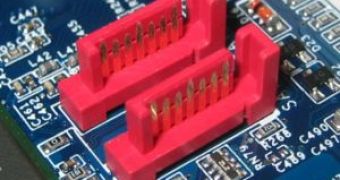Parallel ATA or IDE data transfer interfaces have been around for some years now and they are slowly but steadily driven to extinction by the ever increasing adoption of the fast and more manageable Serial ATA interfaces. As more and more computer hardware manufacturing companies are abandoning the use of the old standards, the IDE interface may soon be completely replaced and in the near future we may see computers that are offering no support for them.
This state of affairs was initiated as most hard disk drive manufacturers announced that they will start producing more Serial ATA compatible devices and fewer Parallel ATA ones and their example was followed by the mainboard producers that are now integrating a single IDE port into their products.
The debate of when the IDE data transfer interface will be phased out completely just received a boost as it looks like its days are numbered and the original estimate of two years is very likely to be severely cut as already there is critical shortage of Parallel ATA hard disk drives. According to the news site mybroadband, Shane Hutchinson, Western Digital Brand Manager at ICT distributor, Pinnacle Micro, said that the Serial ATA interface has already been around in one form or another for about three years now and thanks to its advantages over the previous standards, it ''is now arguably the interface to choose''.
While there are a large number of computer systems that are still using the old interface, the Serial ATA market acceptance is solid and as those computers themselves are becoming obsolete, the IDE interface is slowly dying out as customers are now looking toward the advantages offered by the faster SATA.
"By April next year, or sooner, the 160GB version will be the industry-standard entry level. If there are shortages of 80GB versions this could happen before April. In addition, by the first or second quarter of next year, the pricing of the 80GB and 160GB solutions will be the same. It would be advisable for any companies who are planning to roll out projects next year to switch to a 160GB-based platform."
While a number of hard disk drive manufacturing companies like Western Digital are still producing drives compatible with the old Parallel ATA interface, the same companies are encouraging their clients to adopt the new standard as soon as possible as it will result in greater performance and compatibility with new systems. "The move to SATA is definitely increasing markedly due to the general expectation that its higher performance will endorse it as the next standard interconnect for external devices'', Shane Hutchinson said.

 14 DAY TRIAL //
14 DAY TRIAL //